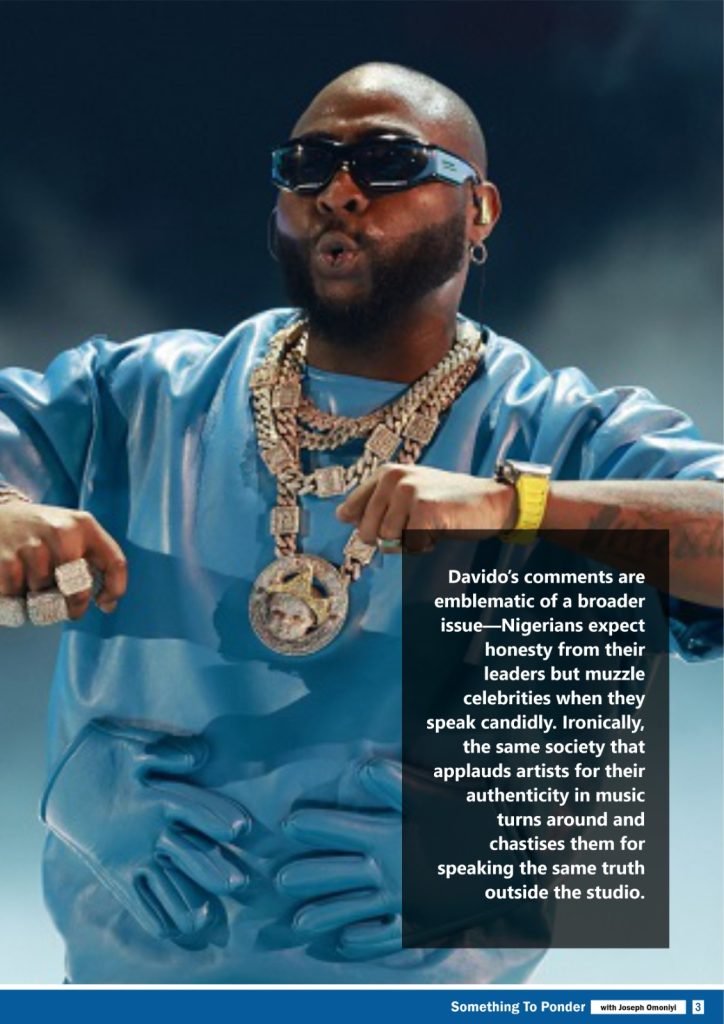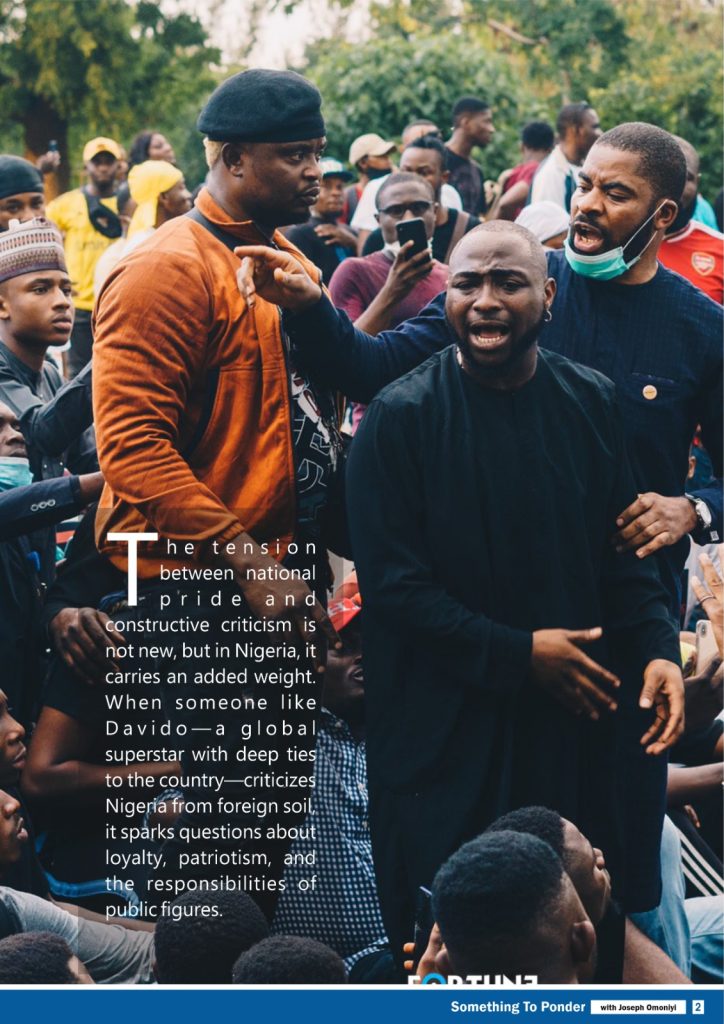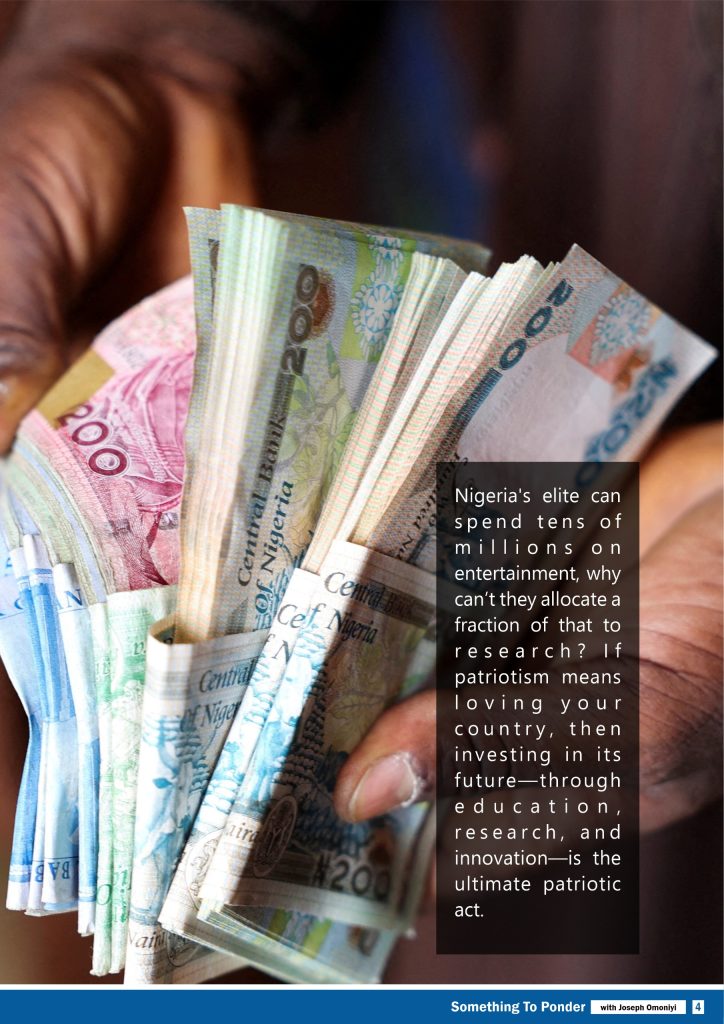Don Jazzy donates ₦100 million to charity, Davido raises hundreds of millions for NGOs, then turns around to lament the economy. The irony is almost theatrical. While millions are poured into luxury lifestyles and charity galas, Nigeria’s researchers beg for crumbs. A professor, capable of revolutionizing Nigerian education, is paralyzed by financial constraints. But who funds education when champagne is in higher demand?

Let’s back up a little. Davido’s recent remarks advising Nigerians and Black Americans to reconsider relocating to Nigeria due to its economic challenges have sparked a fiery debate. The mixed reactions are unsurprising. In a country where patriotism is often confused with denial, honesty can be a double-edged sword.
On one side, supporters like DJ Switch and activist Inibehe Effiong argue that Davido merely stated the obvious: the economy is in crisis. Should we plaster over the cracks with false pride? They assert that this culture of “saving face” perpetuates complacency and stifles accountability. Effiong’s statement highlights a crucial point—patriotism isn’t blind loyalty; it’s confronting hard truths to inspire change.
On the opposing front, figures like APC chieftain Joe Igbokwe and former presidential aide Bashir Ahmed insist that Davido’s words were harmful and unpatriotic. They argue that public figures carry a responsibility to uphold Nigeria’s image, especially on foreign soil. Igbokwe’s emotional appeal—“Nigeria made Davido”—implies a debt of loyalty that forbids criticism, no matter how justified.
But here’s the real question: Is criticizing Nigeria from abroad an act of betrayal, or is it an essential wake-up call?
The tension between national pride and constructive criticism is not new, but in Nigeria, it carries an added weight. When someone like Davido—a global superstar with deep ties to the country—criticizes Nigeria from foreign soil, it sparks questions about loyalty, patriotism, and the responsibilities of public figures.
Criticism from abroad is often perceived as airing dirty laundry to outsiders, a sentiment rooted in Nigeria’s historical sensitivity to external judgment. Critics argue that such remarks damage the nation’s image and could deter foreign investors or tourists. This viewpoint holds that those with large platforms have a duty to highlight the country’s potential and not just its problems.
However, let me digress a bit. One of the things I think we need to reconsider is where our treasure lies. The entertainment industry where the messenger is a big player for example. The entertainment industry, riding high on the success of Afrobeats and Nollywood, is a paradox. Celebrities rake in billions, make headlines for philanthropy, yet we still hear the same complaints about failing infrastructure and brain drain. And it’s not just them. Corporate Nigeria isn’t guilt-free either. Dangote and Otedola build university blocks, but how many corporations are investing in R&D that could secure Nigeria’s future?

Meanwhile, in the West, billionaires spend billions on research, shaping future technology and policy. Yet, in Nigeria, we’re still stuck glorifying immediate gratification over sustainable innovation. The narrative hasn’t shifted much—“party now, worry later” seems to be the unspoken motto. Are we investing in fleeting legacies rather than enduring innovations?
Davido’s comments are emblematic of a broader issue—Nigerians expect honesty from their leaders but muzzle celebrities when they speak candidly. Ironically, the same society that applauds artists for their authenticity in music turns around and chastises them for speaking the same truth outside the studio.
However, as we dissect the message, we must also dissect the messenger. Billions are poured into extravagant lifestyles and ‘philanthropy’ by the elite, yet research and innovation—a proven pathway out of economic stagnation—remain underfunded. The contrast is glaring. Femi Otedola’s N2.74 billion donation to Augustine University, Dangote’s engineering buildings, and BUA’s contributions to physical infrastructure are commendable, but why are similar amounts not channeled into research that could solve Nigeria’s systemic issues?
Don’t miss:
Sex, Power, and Cameras: When Public Office Gets Too Personal
“Do You Know Who I Am?” – The Art of Nigerian ‘Bigmanism’ and its Everyday Performers
The Nigerian Japa Syndrome: Myths and Truths (I)
The Things-Fall-Apart-Okonkwo Debate: Can Idris Elba Roll Fufu?
Take Elon Musk, for instance. His companies are built on relentless investment in research and development (R&D), positioning him to control future industries. Bill Gates’ philanthropic ventures focus on solving global health crises through research. Yet, in Nigeria, R&D funding remains a footnote in corporate responsibility, overshadowed by short-term philanthropic gestures and grandiose building projects.
Consider the Nigerian professor who’s developed a groundbreaking educational concept but can’t secure the ₦10-20 million needed for implementation. He doesn’t have the luxury of performing at concerts or hosting charity galas. His innovation, though capable of transforming Nigeria’s education sector, might die with him because research isn’t glamorous enough to attract sponsors.
This is the second brain drain—knowledge lost to neglect rather than emigration. We’re not just losing talent to the West; we’re burying it with our indifference.
If Nigeria’s elite can spend tens of millions on entertainment, why can’t they allocate a fraction of that to research? If patriotism means loving your country, then investing in its future—through education, research, and innovation—is the ultimate patriotic act. Davido’s critics may call him unpatriotic, but perhaps his candidness is a form of tough love. Sometimes, love isn’t about shielding your partner from the truth; it’s about telling them what they need to hear, no matter how uncomfortable.
This isn’t just a challenge to the elite but to every Nigerian who claims to want a better nation. The future belongs to those who invest in it. Who is ready to claim it?
No doubt, Davido’s statement is a reality check, not just for those abroad but for Nigerians at home. It forces a conversation that can no longer be avoided: How long can we pretend everything is fine when essential services crumble and citizens seek better lives abroad? In this context, silence or blind patriotism isn’t loyalty—it’s complicity.

However, if we strip away the emotional reactions, one must admit that Davido’s comment lacked the depth of critical thought expected from someone in his position. His words weren’t just a critique of Nigeria’s governance but a broad-stroke dismissal of the country’s prospects, with potential ripple effects far beyond his intention. While the economy is undeniably in dire straits, sweeping statements like his can inadvertently dissuade investment and hinder progress for ordinary Nigerians—especially those in vulnerable communities who depend on diaspora-driven development projects.
Imagine a Nigerian in the diaspora contemplating a homecoming investment—perhaps in real estate, agriculture, or tech start-ups in places like Badagry or Ikorodu. One pessimistic soundbite from a figure like Davido could be enough to sow doubt, causing them to rethink or cancel plans. The outcome? Fewer job opportunities, stalled community growth, and a ripple effect that stymies local economic progress. Davido may have intended to criticize the government, but inadvertently, his words could harm the very citizens he claims to advocate for, far more than it would disrupt any government official’s lifestyle.
The pursuit of a better nation doesn’t demand silence in the face of failure, but it does require strategic communication. Many well-meaning Nigerians strive to balance patriotic allegiance with constructive criticism. Davido is not the first to voice concerns about Nigeria’s trajectory, nor will he be the last. However, there’s a delicate art to public discourse, especially for influential figures: What you say, where you say it, why you are saying it, and how you say it are critical factors that can determine whether your message ignites change or fuels disillusionment.
A more thoughtful approach could have highlighted both the challenges and potential solutions, encouraging Nigerians abroad to engage with and invest in the country’s future rather than retreating from it. For instance, Davido could have used the platform to advocate for systemic reforms while simultaneously encouraging the diaspora to remain hopeful and engaged. This dual narrative—acknowledging flaws while fostering optimism—resonates more constructively and inspires action rather than resignation.
Public figures wield immense influence, and their words often carry consequences far beyond their immediate intentions. When the likes of Elon Musk or Bill Gates speak about national or global issues, their statements are meticulously framed, knowing their words can move markets and shape public sentiment. Nigerian celebrities should take note: it’s not just about voicing frustrations but doing so with responsibility and foresight. The diaspora, foreign investors, and even local citizens often take cues from such prominent voices. Misguided rhetoric can lead to a collective loss of confidence, stagnating efforts to improve infrastructure, governance, and economic stability.
Davido’s comments underscore a broader issue: the need for responsible dialogue about Nigeria’s future. Criticism is essential for progress, but it must be constructive and nuanced, offering more than just despair. Globally, countries have benefited from vocal critics who challenge the status quo. South Africa’s apartheid system drew international condemnation largely due to its own citizens calling out the regime on global platforms. Similarly, Martin Luther King Jr.’s criticisms of American inequality were essential to the U.S. civil rights movement. These examples highlight that sometimes, external pressure, driven by internal voices, is necessary for meaningful change. The challenge is – How do we address our nation’s flaws without diminishing its potential? The answer lies in fostering discussions that build bridges, inspire action, and, above all, prioritize the well-being of ordinary Nigerians over sensational rhetoric.





